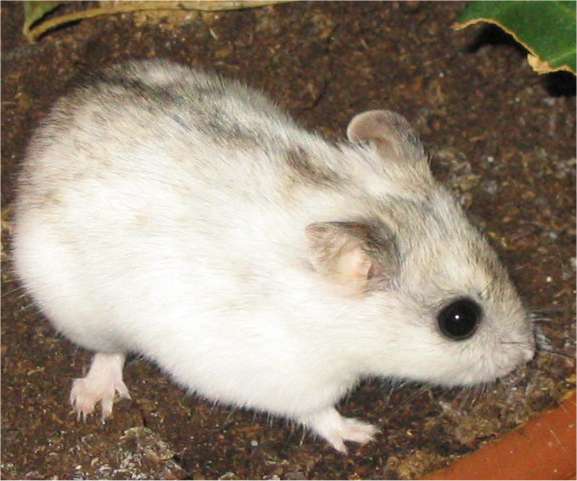|
| 질의: brown rat | 결과: 120번째/132 | |
Chinese Hamster (Cricetulus griseus) - Wiki
| 제목: | Chinese Hamster (Cricetulus griseus) - Wiki
| |

| 해상도: 577x481
파일크기: 33613 Bytes
등록시간: 2006:12:20 20:21:48
|
Chinese hamster
From Wikipedia, the free encyclopedia
[Photo] Chinese hamster (Cricetulus griseus), white spotted type. Picture taken by Reinoutr (http://en.wikipedia.org/wiki/user:Reinoutr) of own Chinese Hamster, called "Pruts". Date 19:35, 23 January 2006.
The Chinese Hamster is a species of hamster, scientific names Cricetulus griseus, which originates in the deserts of northern China and Mongolia. These animals grow to between 7.5 and 9 cm in length and as adults can weigh 50-75 grams. They live two to three years on average. The Chinese hamster is often kept as a pet or (in the past) as a laboratory animal.
A Chinese hamster's body proportions, compared with those of other hamsters, appear "long and thin" and they have (for a hamster) a relatively long tail. Chinese hamsters are not related to the social "dwarf" hamsters. The term "dwarf" is often used to refer solely to animals in the genus Phodopus, (the two types of Russian Dwarf Hamsters and Roborovskii Dwarf Hamsters).
The wild colour is greyish brown above with a black stripe down the spine and a whitish belly. This coloration, combined with their lithe build and longer tail, makes them look "mousy" to some eyes and, in fact, they are members of the group called ratlike hamsters. Besides the wild colour, a well-known variation is the white-spotted Chinese hamster, which often is greyish white all over, with only a dark stripe on its back.
They have quiet temperaments and are easily handled; one of their endearing traits is that of clinging to a finger with all four paws, rather like a harvest mouse on a corn stalk. Chinese hamsters can be quite nervous as youngsters but, once they are tame, display an endearing calmness and gentleness of character.
In the past, Chinese hamsters were commonly used laboratory animals, until they were replaced by the common mouse and rat, which are easier to keep and breed. However, quite a few biotech drugs are still being produced by putting the gene for the protein into Chinese hamster ovary (CHO) cells, which then produce the protein.
Of note, some US states such as California regard the Chinese hamster as a pest, and as a result require a special permit to own, breed or sell. Other states such as New Jersey call it an exotic animal, and require a similar permit, in order to prevent the proliferation of non-indigenous animals.
The latin name
There is quite some confusion over the latin name of the Chinese hamster and the closely related Chinese striped hamster. Some people consider the Chinese hamster (Cricetulus griseus) and the Chinese striped hamster (Cricetulus barabensis) different species [1], whereas others classify them as identical [2], the Chinese striped hamster as a subspecies of the Chinese hamster (in which case the latin name of the Chinese striped hamster would be Cricetulus griseus barabensis) [3] or the other way round (in which case the latin name of the Chinese hamster would be Cricetulus barabensis griseus) [4].
http://en.wikipedia.org/wiki/Chinese_hamster
| The text in this page is based on the copyrighted Wikipedia article shown in above URL. It is used under the GNU Free Documentation License. You may redistribute it, verbatim or modified, providing that you comply with the terms of the GFDL. |
|
댓글 |
|---|
| | 손님 |
|
| I am Kaelyn Wheeler. I am in 3rd grade. My class is doing animal reports.I chose Chinese Hamsters.I dont know much about them, but so far thier GREAT!!!!!!!!!!!!!!! |
| | 손님 |
|
| I am Kaelyn Wheeler. I am in 3rd grade. My class is doing animal reports.I chose Chinese Hamsters.I dont know much about them, but so far thier GREAT!!!!!!!!!!!!!!! |
^o^
동물그림창고 똑똑전화 누리집
^o^
|
|
|